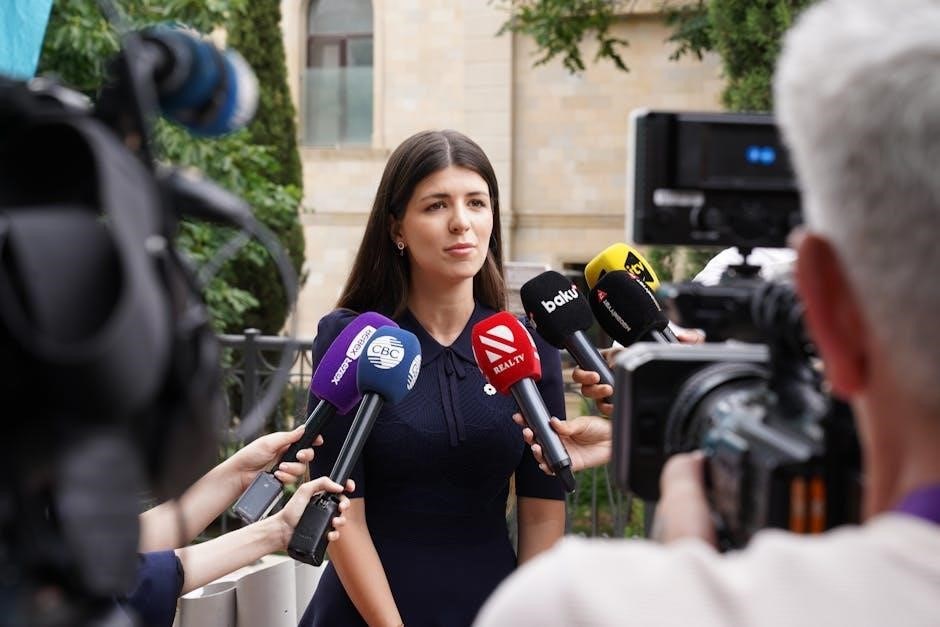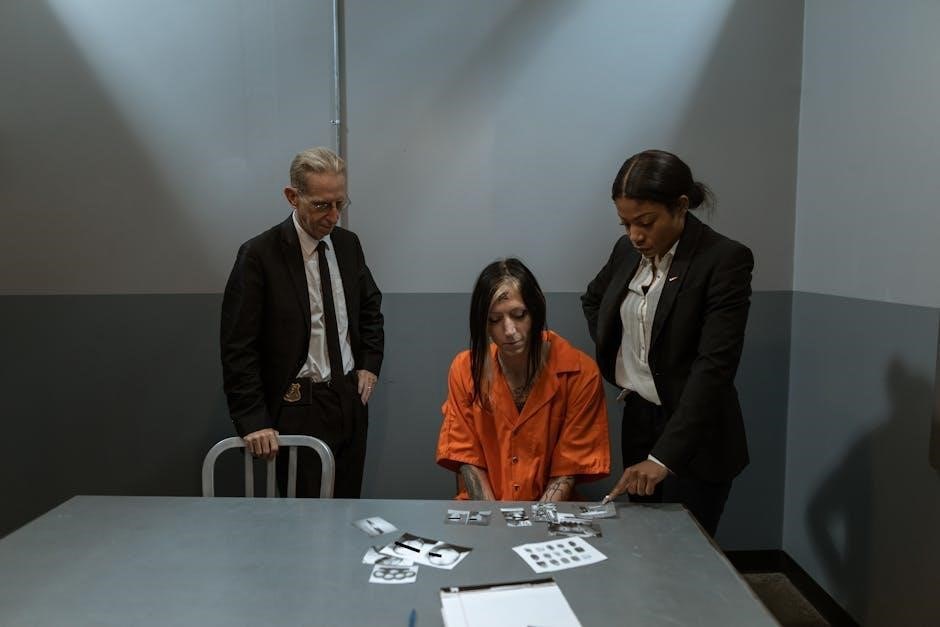This comprehensive guide provides detailed answers to anesthesia interview questions, covering key topics like patient assessment, anesthetic mechanisms, and behavioral scenarios․ It helps candidates prepare effectively, boosting confidence and knowledge for successful interviews․
Purpose of the Guide
The purpose of this guide is to provide a comprehensive resource for candidates preparing for anesthesia interviews․ It offers detailed insights into common questions, sample answers, and strategies to excel in interviews․ The guide covers a wide range of topics, including general anesthesia principles, subspecialties, patient assessment, and behavioral scenarios․ By addressing both clinical and situational questions, it helps candidates demonstrate their knowledge, problem-solving skills, and communication abilities․ The guide is designed for residents, fellows, and practicing anesthesiologists seeking to improve their interview performance․ It also includes tips for showcasing teamwork, stress management, and ethical decision-making, which are critical in anesthesia practice․ This resource aims to boost confidence, refine responses, and ensure candidates are well-prepared for the challenges of anesthesia interview questions․

Key Topics Covered in the PDF
The PDF covers a wide range of essential topics to help candidates excel in anesthesia interviews․ It includes general anesthesia-related questions, subspecialties, patient assessment techniques, and behavioral scenarios․ The guide also addresses technical and clinical aspects, such as mechanisms of anesthetic agents and management of complications; Additionally, it explores residency and fellowship-related questions, mock interview benefits, and common mistakes to avoid․ The document provides sample answers to frequently asked questions, ensuring candidates are well-prepared․ It also offers insights into current advances in anesthesia technology and communication skills․ By covering both foundational and specialized topics, the PDF serves as a holistic resource for candidates aiming to succeed in their interviews․ The structured approach ensures comprehensive preparation, helping candidates stand out and showcase their expertise effectively․
Importance of Preparation for Anesthesia Interviews
Preparation is crucial for anesthesia interviews, as it ensures candidates can confidently address both technical and behavioral questions․ The competitive nature of anesthesiology requires a deep understanding of clinical practices, patient assessment, and subspecialties․ Proper preparation helps candidates articulate their knowledge clearly and demonstrate their problem-solving skills․ It also allows them to showcase their passion for the field and align their goals with the program’s values․ By reviewing common questions and practicing responses, candidates can build confidence and present themselves as well-rounded professionals․ Additionally, understanding current advances in anesthesia technology and being able to discuss ethical dilemmas or stressful situations highlights their readiness for real-world challenges; Thorough preparation not only enhances performance but also reflects a commitment to excellence, making candidates stand out in a competitive environment․

Common Anesthesia Interview Questions
Anesthesia interviews often include questions on pharmacology, physiology, and clinical scenarios․ Candidates are frequently asked about anesthetic mechanisms, patient assessment techniques, and crisis management strategies․
General Anesthesia-Related Questions
In anesthesia interviews, general anesthesia-related questions are fundamental․ These questions assess your understanding of anesthesia basics, patient assessment, and clinical practices․ Common topics include types of anesthesia, airway management, and pharmacology․ Interviewers often ask about the differences between general, regional, and local anesthesia, as well as the principles of anesthesia machines and ventilators․
Questions may also focus on preoperative evaluations, such as assessing a patient’s physical status and optimizing comorbid conditions․ Understanding the ASA physical status classification and its implications is crucial․ Additionally, expect questions on anesthetic pharmacology, including mechanisms of action for common agents like propofol, sevoflurane, and fentanyl․
Be prepared to discuss the basics of oxygenation, ventilation, and hemodynamic stability during anesthesia․ These questions are designed to evaluate your foundational knowledge and ability to apply it in clinical scenarios․
Subspecialties in Anesthesia
Anesthesia encompasses various subspecialties, each requiring unique expertise․ Pain Management focuses on treating chronic and acute pain using advanced techniques․ Critical Care Anesthesia involves managing critically ill patients in intensive care settings․ Cardiac Anesthesia deals with surgeries involving the heart, while Pediatric Anesthesia specializes in anesthesia care for infants and children․ Obstetric Anesthesia addresses pregnancy-related procedures, including childbirth․ Regional Anesthesia emphasizes nerve blocks and localized anesthesia for surgical procedures․ Ambulatory Anesthesia caters to outpatient surgeries, ensuring rapid recovery․ Neurosurgical Anesthesia manages patients undergoing brain or spinal surgeries․ These subspecialties highlight the diversity of anesthesiology, allowing professionals to tailor their skills to specific patient populations and surgical needs․
Understanding these subspecialties is crucial for interviews, as they demonstrate the breadth of the field and the candidate’s adaptability to different clinical scenarios․
Questions on Patient Assessment and Preparation
Patient assessment and preparation are critical components of anesthesia care․ Interview questions often focus on evaluating a patient’s physical status, medical history, and laboratory results to determine anesthesia risks․ Key areas include airway assessment, cardiovascular evaluation, and identification of comorbidities․ Candidates may be asked about preoperative fasting guidelines, medication management, and strategies to optimize patients before surgery․ Understanding how to tailor anesthesia plans to individual needs is essential․ For example, questions might explore how to handle patients with obstructive sleep apnea or those with significant cardiac disease․ Additionally, the importance of informed consent and patient education is often emphasized․ These questions assess the candidate’s ability to ensure patient safety and deliver personalized care․ Demonstrating a systematic approach to preoperative evaluation and preparation is vital for success in anesthesia interviews․

Behavioral and Situational Questions
Behavioral and situational questions evaluate how candidates handle real-life scenarios in anesthesia․ Topics include decision-making under stress, teamwork, and communication skills, providing insights into problem-solving abilities and interpersonal dynamics․
How to Handle Stressful Situations in the OR
Handling stressful situations in the operating room requires a combination of composure, focus, and effective decision-making․ Anesthesia professionals must remain calm and composed, even in high-pressure scenarios, to ensure patient safety and optimal outcomes․ One effective strategy is to rely on systematic approaches and established protocols, which help maintain clarity of thought under stress․ Clear communication with the surgical team is also crucial, as it ensures everyone is aligned and working toward the same goal․ Additionally, prioritizing tasks and delegating responsibilities when necessary can help manage stress․ Reflecting on past experiences and learning from them can improve one’s ability to handle future stressful situations․ Practicing these strategies through real-life scenarios or simulations can build confidence and competence, making it easier to navigate challenging moments in the OR․
Examples of Teamwork in Anesthesia Practice
Teamwork is essential in anesthesia practice, as it ensures seamless coordination between anesthesiologists, surgeons, nurses, and other healthcare professionals․ A key example is during surgical procedures, where effective communication and collaboration are critical to maintaining patient safety․ For instance, anesthesiologists must work closely with surgical teams to anticipate and respond to changes in a patient’s condition, such as blood pressure fluctuations or unexpected bleeding․ Another example is in preoperative planning, where anesthesiologists collaborate with surgeons to develop tailored anesthesia plans based on the patient’s medical history and the procedure’s requirements․ Additionally, teamwork is vital during emergencies, such as cardiac arrests or anaphylactic reactions, where rapid, coordinated actions are necessary to stabilize the patient․ By fostering a culture of mutual respect and open communication, anesthesia teams can enhance patient outcomes and ensure efficient workflow in high-stakes environments․
Communication Skills with Patients and Colleagues
Effective communication is a cornerstone of anesthesia practice, ensuring clear exchanges of information between patients, colleagues, and other healthcare providers․ Anesthesiologists must communicate complex medical information in a way that is understandable to patients, addressing their concerns and ensuring informed consent․ This includes explaining anesthesia options, risks, and benefits in a compassionate and empathetic manner․ With colleagues, clear communication is critical for coordinating care, particularly in high-stakes environments like the operating room․ Anesthesiologists must articulate patient status, anesthesia plans, and any changes promptly to ensure seamless teamwork․ Active listening and clarity in communication help prevent errors and enhance patient safety․ Strong interpersonal skills also foster collaboration, enabling anesthesia teams to work cohesively toward optimal patient outcomes․ Developing these skills is essential for building trust and ensuring effective care delivery in anesthesia practice․

Technical and Clinical Questions
Technical and clinical questions assess your knowledge of anesthesia mechanisms, drug pharmacology, equipment operation, and complication management․ These questions evaluate your ability to apply scientific principles in clinical scenarios․
Mechanisms of Anesthetic Agents
Understanding the mechanisms of anesthetic agents is crucial for any anesthesia professional․ These drugs work by modulating neuronal activity in the brain, primarily through interactions with ion channels and neurotransmitter receptors․ Inhalational anesthetics, such as sevoflurane and isoflurane, act on GABA receptors to enhance inhibitory neurotransmission, while intravenous agents like propofol and ketamine affect NMDA receptors to reduce excitatory neurotransmission․ The pharmacokinetics of these agents, including absorption, distribution, metabolism, and excretion, influence their onset, duration, and recovery profiles․ Clinicians must understand how these mechanisms translate to clinical effects, such as sedation, analgesia, and amnesia․ Mastery of these concepts allows anesthesiologists to tailor anesthesia regimens to individual patient needs, ensuring safety and efficacy․ This knowledge is frequently tested in interviews to assess a candidate’s depth of understanding and ability to apply scientific principles to clinical practice․
Management of Complications During Anesthesia
Managing complications during anesthesia requires prompt recognition and decisive action to ensure patient safety․ Common complications include hypoxia, bronchospasm, anaphylaxis, and malignant hyperthermia․ Hypoxia is addressed by ensuring airway patency and adequate oxygenation, while bronchospasm may require bronchodilators and adjusting anesthetic depth․ Anaphylaxis demands immediate administration of epinephrine and supportive care․ Malignant hyperthermia necessitates stopping triggers like volatile anesthetics, administering dantrolene, and controlling hyperthermia․ Effective communication with the surgical team and clear decision-making are critical․ Preparation for emergencies, such as having a difficult airway cart or crash cart available, is essential․ Regular simulation training and familiarity with algorithms for managing crises enhance readiness․ The ability to remain calm and systematically address complications is a key skill assessed in interviews, reflecting a candidate’s clinical competence and patient safety priorities․
Current Advances in Anesthesia Technology
Recent advancements in anesthesia technology have significantly improved patient care and safety․ One major innovation is the development of automated anesthesia delivery systems, which use real-time data to adjust anesthetic dosage precisely․ These systems reduce human error and enhance titration accuracy․ Another breakthrough is the integration of advanced monitoring tools, such as depth of anesthesia monitors and neuromuscular blockade analyzers, which help anesthesiologists optimize anesthesia levels and prevent complications․ Additionally, point-of-care ultrasound devices are now widely used for nerve blocks and vascular access, improving procedural success rates․ Tele-anesthesia platforms are emerging, enabling remote monitoring and consultation, especially in underserved areas․ Lastly, advancements in information technology, such as electronic health records and data analytics, are streamlining preoperative assessments and postoperative care․ These technologies not only enhance efficiency but also improve patient outcomes, making them critical topics in modern anesthesia practice and interviews․

Residency and Fellowship-Related Questions
Understand program strengths, discuss career goals, and articulate why you chose anesthesiology․ Highlight experiences aligning with fellowship opportunities and how they prepare you for future challenges․
Why Choose a Career in Anesthesiology?

A career in anesthesiology offers a unique blend of clinical challenge, personal fulfillment, and opportunities to make a significant impact on patient outcomes․ Anesthesiologists play a critical role in ensuring patient safety, managing pain, and stabilizing vital functions during surgical procedures․ The field combines cutting-edge medical technology with hands-on patient care, making it intellectually stimulating and rewarding․ Additionally, anesthesiology provides flexibility, with opportunities to specialize in various subspecialties such as pediatric, cardiothoracic, or pain management․ The ability to work in diverse clinical settings, from operating rooms to intensive care units, further enhances its appeal․ Many are drawn to the fast-paced environment and the satisfaction of contributing to successful surgical outcomes․ This specialty also offers competitive compensation and a structured career path, making it an attractive choice for those passionate about perioperative medicine and patient well-being․
Experiences During Residency Training
Residency training in anesthesiology is a transformative period that shapes both clinical expertise and professional growth․ Residents gain hands-on experience in diverse clinical settings, including operating rooms, intensive care units, and pain management clinics․ They are exposed to a wide range of surgical cases, from routine procedures to high-acuity surgeries, allowing them to develop proficiency in anesthesia techniques and patient management․ The program emphasizes structured learning, with regular didactic sessions, case discussions, and simulation-based training․ Residents also refine their decision-making skills, learning to handle emergencies and complex patient scenarios effectively․ Mentorship from experienced faculty provides guidance and support throughout the training․ Additionally, residents participate in quality improvement projects and research, fostering a deeper understanding of the field․ These experiences not only enhance technical competence but also cultivate empathy, teamwork, and communication skills, essential for a successful career in anesthesiology․ The residency journey is both challenging and rewarding, preparing trainees for the demands of independent practice․
Fellowship Opportunities and Specializations
Fellowship opportunities in anesthesiology offer advanced training in specialized areas, allowing practitioners to deepen their expertise․ Common specializations include Regional Anesthesia, Pain Medicine, Critical Care Medicine, and Pediatric Anesthesia․ These programs provide hands-on experience in managing complex cases and refining technical skills․ Fellows also engage in research and contribute to medical advancements․ Pursuing a fellowship enhances career prospects and prepares individuals for leadership roles․ It is a valuable step for those passionate about a specific subspecialty, enabling them to deliver cutting-edge care and improve patient outcomes․ With focused training, fellows gain the proficiency needed to excel in their chosen field, making fellowships a crucial part of professional development for aspiring specialists in anesthesiology․

Mock Interviews and Practice
Mock interviews simulate real interview scenarios, helping candidates refine their responses and build confidence․ Regular practice ensures clarity and precision in articulating thoughts and experiences, enhancing overall performance and readiness for actual interviews․
Benefits of Mock Interviews for Anesthesia Positions
Mock interviews are an invaluable tool for preparing for anesthesia positions․ They allow candidates to practice answering questions in a realistic setting, helping to build confidence and refine communication skills․ By simulating actual interview scenarios, mock interviews enable individuals to identify strengths and areas for improvement․ They also provide an opportunity to receive constructive feedback, which can be instrumental in fine-tuning responses and body language․ Additionally, mock interviews help reduce anxiety and familiarize candidates with the interview format, making them feel more prepared and composed during the actual interview․ Regular practice through mock interviews ensures that applicants can articulate their experiences and qualifications effectively, increasing their chances of success in competitive anesthesia programs․
Common Mistakes to Avoid in Anesthesia Interviews
During anesthesia interviews, candidates often make avoidable mistakes that can harm their chances of success․ One common error is lack of preparation, such as not reviewing their resume, research, or the program’s specifics․ Another mistake is poor communication, including rambling or failing to clearly articulate thoughts․ Candidates may also underestimate the importance of showcasing their passion for anesthesiology, appearing disinterested or unenthusiastic․ Additionally, some applicants focus too much on their weaknesses without highlighting their strengths or growth․ Neglecting to ask thoughtful questions to the interviewers is another oversight, as it demonstrates a lack of engagement․ Lastly, many candidates fail to address their mistakes or controversial topics in their application, leaving the interviewers with unanswered concerns․ Avoiding these pitfalls requires thorough preparation, self-awareness, and practice in articulating a compelling narrative about their qualifications and aspirations․
Rehearsing Answers to Frequently Asked Questions
Rehearsing answers to frequently asked questions is crucial for acing anesthesia interviews․ Candidates should identify common queries, such as “Why anesthesiology?” or “How do you handle emergencies?”, and practice concise, confident responses․ Reviewing clinical scenarios, such as managing difficult airways or hypotension, ensures readiness for technical questions․ Behavioral questions, like “Describe a challenging case,” require structured answers using frameworks like STAR ( Situation, Task, Action, Result)․ Mock interviews or recording oneself can help refine delivery and tone․ Tailoring responses to highlight relevant skills and experiences is essential․ Over-preparedness builds confidence and reduces anxiety, allowing candidates to articulate their strengths effectively․ Regular practice ensures clarity and poise, making a lasting impression on interviewers․

Using PDF Resources Effectively
Effectively using anesthesia interview PDFs involves organizing content, prioritizing high-yield topics, and practicing with sample questions․ Regular review and active learning techniques enhance preparation and retention․
Top Recommended PDF Guides for Anesthesia Interviews
Several PDF guides are highly recommended for anesthesia interviews, each offering unique insights and preparation strategies․ Anesthesia Interview Questions and Answers by Smith and Johnson is a comprehensive resource covering clinical and behavioral topics․ Another top choice is The Anesthesiology Interview Guide by the ASA, which focuses on real-life scenarios and ethical dilemmas․ Cracking the Anesthesia Interview by Williams provides tips on body language and common pitfalls․ Additionally, Mastering Anesthesia Interviews by Brown includes mock interviews and practice questions․ These guides are widely praised for their clarity and relevance, making them indispensable for candidates aiming to excel in their interviews․ They complement each other well, offering a balanced approach to preparation․
How to Utilize PDF Materials for Maximum Preparation

To maximize preparation using anesthesia interview PDF materials, start by skimming through the documents to identify key topics and frequently asked questions․ Focus on sections that align with your strengths and areas needing improvement․ Use bookmarks or tabs to navigate easily between chapters․ Take notes on critical points and review them regularly to reinforce memory․ Practice answering sample questions aloud, simulating real interview scenarios․ Pay attention to explanations and rationales provided for each answer, as they offer valuable insights․ Customize your study schedule by dedicating specific times to different sections, ensuring a balanced approach․ Regularly review and refresh your knowledge to build confidence and clarity․ By systematically utilizing these PDF guides, you can enhance your performance and present yourself as a well-prepared candidate during anesthesia interviews․
